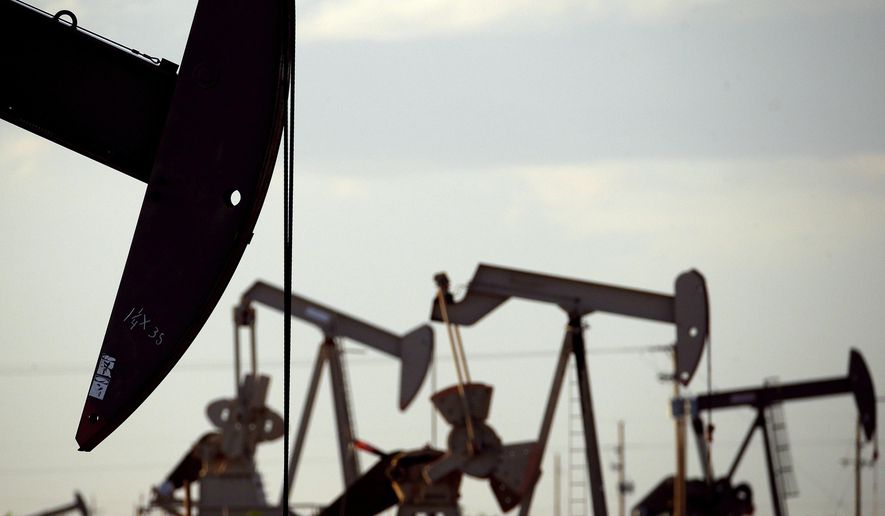House Democrats are set to grill executives from the biggest oil companies on Wednesday with accusations that corporate greed is to blame for sky-high gasoline prices — but the executives have another plan.
The CEOs will fling the blame back at President Biden and Democrats for embracing anti-energy policies that contribute to soaring prices, industry insiders told The Washington Times.
“The message will be: You don’t support the industry, you want to undermine investment, this is what happens,” said an energy industry source who did not want to be identified previewing the CEOs’ testimony.
Executives of six major oil companies — BP America, Chevron, Devon Energy, ExxonMobil, Pioneer Natural Resources and Shell USA — are scheduled to testify before the House Energy and Commerce Committee, where they are expected to be hammered by Democrats with charges that the companies engage in price-gouging and market manipulation to make consumers pay more for energy and gasoline.
The executives will pin the blame on Democratic policies that discourage increased drilling and other production efforts, as well as the Russian invasion of Ukraine.
They will argue that a lack of oil supply predated the geopolitical conflict and is the result of discouraging fossil fuel investments. The executives also will condemn “windfall profit” taxes proposed by Democrats that they say would further stifle production.
Kathleen Sgamma, president of Western Energy Alliance, which represents 200 oil and natural gas companies in the western U.S., gave a preview of the industry response at a Senate Commerce, Science and Transportation Committee on Tuesday.
She told senators that smaller oil companies’ biggest hindrance to increased production has been a lack of capital for funding expensive wells that can cost millions of dollars, which she blamed on the Biden administration for its anti-fossil fuel messaging and policies that she said were “designed to suppress American production.”
Ms. Sgamma also called for the Securities and Exchange Commission to ditch its plans to require publicly traded companies to disclose emissions data and risks posed by climate change in their financial health statements.
“We are a partner in climate change,” Ms. Sgamma said. “These climate change policies that are meant to suppress oil and natural gas production are counterproductive to those climate change goals, as well as contributing to higher energy prices.”
The American Petroleum Institute (API) also has come out swinging in the run-up to Wednesday’s Big Oil hearing. The lobbying group criticized President Biden’s decision to release a historic 1 million barrels of oil per day for the next six months from the country’s Strategic Petroleum Reserve, blaming high gas prices on energy companies and implementing new fines for some 9,000 unused drilling permits on federal lands and waters.
“The best thing the White House can do right now is to remove barriers to investment in American energy production and infrastructure,” API President and CEO Mike Sommers said in a statement last week. “Unfortunately, today we heard more mixed signals about developing affordable, reliable and secure American natural gas and oil.”
Democrats are set to grill the executives and will press them to forgo stock buybacks and investor returns in exchange for lowering prices and increasing production. They also will focus on the thousands of untapped drilling permits, which experts and insiders have said are largely due to a lack of investment and the uncertainty that oil is present.
Several executives have told shareholders in recent months that their priority is passing along record profits rather than ramping up production. Nearly 60% of companies surveyed by the Dallas Federal Reserve Bank last month said the top reason for restraining growth was due to “investor pressure to maintain capital discipline.” Fewer than 10% said it was because of “government regulations.”
“We want to hold them accountable. I really believe that the oil companies are gouging, and they’re keeping prices artificially high,” House Energy Chairman Frank Pallone, New Jersey Democrat, said in an interview. “They’re using the Ukraine war as an excuse. … It’s disgraceful, in my opinion, that they make these huge profits at the expense of the public.”
Industry insiders and experts have noted that while energy companies are now able to charge higher prices, they were hit with record losses during the pandemic when global demand suddenly plummeted.
Prices at the pump were steadily rising with inflation when Russia invaded Ukraine, the world’s second-largest energy exporter after Saudi Arabia, a move that sent pump prices recently to record highs.
National averages have dropped slightly in recent weeks but remain elevated. The national average for a gallon of regular gas was $4.18 on Tuesday, down 15 cents from last month’s $4.33 peak but up $1.31 from one year ago, according to AAA.
A crucial component in transforming crude oil into consumer products such as gasoline is the refining process. Refining industry analyst John Auers of energy consultancy Turner Mason said an independent refinery separate from the major oil companies could have offered an important perspective on a complex supply chain, had they been part of the Capitol Hill hearings.
Refineries are middlemen in the energy supply chain, paying for crude oil and processing it into gasoline and diesel for consumers. The price of crude oil accounts for about 60% of the gas pump price, according to American Fuel and Petrochemical Manufacturers (AFPM) Chief Industry Analyst Susan Grissom, who pushed back on accusations of producer price gouging.
“Refineries do not root for expensive crude oil. Crude oil is their No. 1 operating expense by far,” Ms. Grissom told reporters during a call this week. “When you talk about price gouging, you can see that all along the petroleum supply chain there have been increases in costs.”
Correction: A previous version of this article incorrectly reported that refineries would not be represented at the hearing and misstated information Mr. Auers provided about the refining process. The major oil companies own refineries.
• Ramsey Touchberry can be reached at rtouchberry@washingtontimes.com.




Please read our comment policy before commenting.